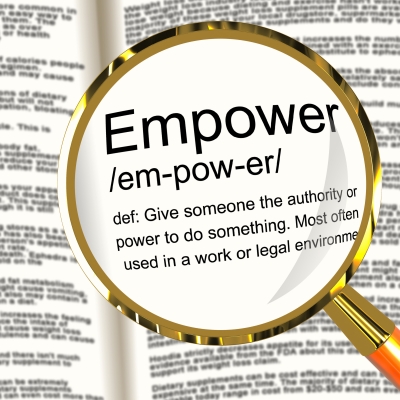What do We Mean by Power?
 The early scene from the movie The Devil Wears Prada, where Miranda Priestly arrives at the office, comically addresses the issue of how the use of power can impact the entire culture of an organization. As she stepped out of the car first thing in the morning, everyone there was walking on eggshells and attempting to avoid who would be the target of her wrath. While this is a Hollywood movie, it does demonstrate how one person's use of their power can impact an entire organization.
The early scene from the movie The Devil Wears Prada, where Miranda Priestly arrives at the office, comically addresses the issue of how the use of power can impact the entire culture of an organization. As she stepped out of the car first thing in the morning, everyone there was walking on eggshells and attempting to avoid who would be the target of her wrath. While this is a Hollywood movie, it does demonstrate how one person's use of their power can impact an entire organization.
The first thing that needs to be explored is what is meant by power and authority. There are two types of power that is exercised in society, whether in the corporate world, government, academia or the family. They are Position Power and Personal Power.
Position Power is bestowed by the institution. It is indicated by level, or title, i.e., president, vice president, director, manager, supervisor, police officer, professor, teacher, mother, coach, father, etc. These titles command certain protocols are are supported by policies, sanctions and authority within the systems of the institution − whether it's a large corporation, the military, government agency educational institution or family.
Personal Power is given by others. It comes from within the individual; in the way he or she attempts to influence or persuade others to accomplish tasks and the respect he or she conveys towards other people. It's based on an aura of charisma, their personality or the type of person they are; as well as their knowledge, experience and connections in their network. We know what this is when we experience it in our interactions with other people, i.e., that doctor has a good bedside manner or that salesperson has a bad attitude, etc.
One kind of power is no better than the other and everyone has both. The challenge is that some people are more comfortable with one type of power over the other. This has nothing to do with gender or personality but is more related to the individual's comfort zone. What happens is that the person exhibits behaviors based upon the type of power that are most comfortable with. This is fine in situations where those behaviors are appropriate. It can create problems, however when the situation calls for behaviors that are from the least-comfortable form of power; and this is where the problems can arise.
The key is balance: Balancing position and personal power. It means drawing upon the appropriate power for the situation at hand and being able to recognize or diagnose the situation and which way is best to respond. When power is used inappropriately, the danger of being stereotyped occurs.
What do We Mean by Empowerment?
Empowerment means to give power to. As a leader, authority is delegated to team members which empowers them to make the decisions needed for the success of the organization in their respective areas. However, as the head of the organization, the leader is at the place where the buck stops. In that case the leader has to employ self-empowerment, which comes from knowing the truth about one's self and not allowing the perceptions of others to hinder him or her from taking the appropriate actions needed for the success of the organization.
